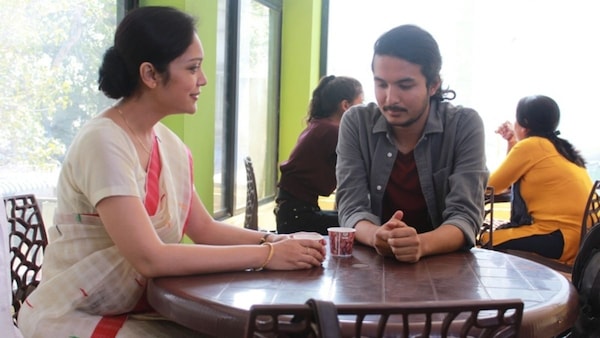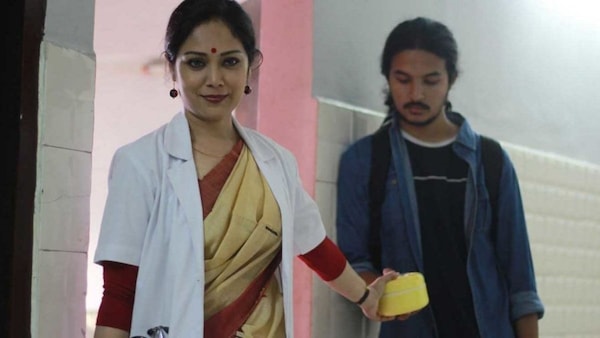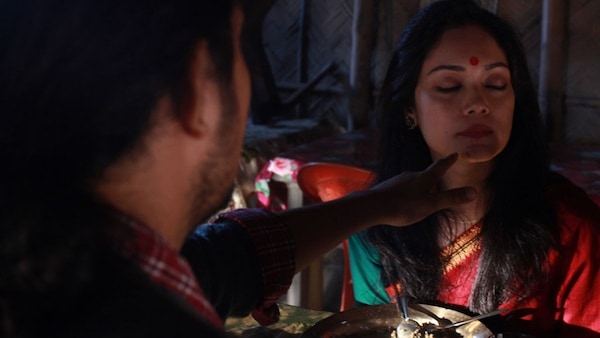Aamis movie review: Bhaskar Hazarika’s genre-bending love story is deeply impactful and contemplative
After suffering acute loneliness in marriage, Niri begins bonding with Sumon. They explore the expansive culinary world their city has to offer, some delicious while some unusual. As their friendship develops over plates of unheard delicacies, their interpersonal dynamics take a morbid turn.

Last Updated: 05.19 PM, Oct 01, 2021
Story: In a quiet land, tucked away beneath the humdrum of daily life, Bhaskar Hazarika’s Assamese film Aamis finds its unusual voice. The narrative follows the growing friendship between Niri (Lima Das) and Sumon (Arghadeep Barua) over their attraction for meat. As Niri (initially a vegetarian) develops a palate for non-vegetarian food, the bond between her and Sumon intensifies. On her husband’s return, things quickly turn awry, compelling Niri to make some grave life decisions.
Review
Aamis is Bhaskar Hazarika’s gift to the world of cinema. A follow-up to his previous Kothanodi, the feature traces how food can become a potent adhesive in fixing relationships and ensuring the bonds strengthen. But Aamis is an amalgamation of multiple genres of storytelling. While on one hand, it emanates the light whiff of a romantic drama, on the other, it makes inroads into the space of horror-comedy. The cinematic tropes in the film are deliciously deranged (a purposeful move on Bhaskar’s part) and never really amount to anything linear.

After an initial bout of indigestion after trying meat for the first time, Niri is visited by Sumon. The two begin an unfettered culinary journey over various kinds of meat that include wild rabbits and catfish with colocasia. Sumon is the head of a meat club, where purists source weird animals to harvest them and ensure they’re cooked in their traditional manner. Niri’s almost virginal entry into the space excites him beyond imagination and he dives in headfirst to handhold her through her meat exploits.
Meat becomes a symbol for carnal love, visceral connections, and unadulterated rapture. The two never emote through “conventional” methods, in fact, in a particularly poignant scene, their hands hover near each other, but rarely do they touch. Their physical restraint with each other is beautifully juxtaposed with the luscious, titillating shots on delicious plates of food (what would popularly be referred to as ‘food porn’). Hazarika clearly annotates his motifs through which he wants to depict his love story.

Niri’s innocence and naiveté are the perfect canvas for audiences to also begin a journey of hope, love and care alongside partners not acknowledged by society, not labelled by any tag. The hardcore maverick in Sumon both excites and terrifies Niri, who perpetually deals with an empty house and an emptier heart (her husband abandons her for months on end, working on medical missions).

While their affection for each other grows, it becomes more evident that they will have to find a way to ensure it develops into something full-fledged. But it is always easier said (read: thought) than done. On Niri’s husband’s return, the equation understandably undergoes a stark change, and she recedes into reticence. Sumon’s disappointment with her also holds minimal ground considering she is absent even to address that. As the distance increases, so do his worries regarding how to retain the friendship. Hazarika’s charm as a filmmaker lies in his abilities to mask each character’s unhinged decisions into a narrative that speaks of love, longing, and most importantly, a need to belong.
Verdict: Though macabre, Aamis is far more than just a story about growing bonds. It surpasses the formulaic approach many filmmakers take and presents us with a genre-bending heady concoction that can hardly be defined in linear adjectives. Aamis is why films should be watched in silent contemplation, to cherish and to remember long after the end credits begin rolling.
Subscribe to our newsletter for top content, delivered fast.

